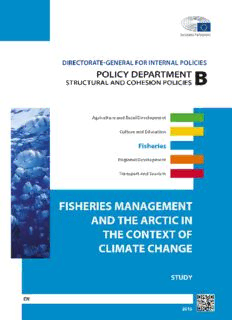Table Of ContentDIRECTORATE-GENERAL FOR INTERNAL POLICIES
POLICY DEPARTMENT B: STRUCTURAL AND COHESION POLICIES
FISHERIES
FISHERIES MANAGEMENT AND
THE ARCTIC IN THE CONTEXT
OF CLIMATE CHANGE
STUDY
This document was requested by the European Parliament's Committee on Fisheries.
AUTHORS
Blomeyer & Sanz S.L.: Roland BLOMEYER, Kim STOBBERUP
Centre of Marine Sciences, University of Algarve: Karim ERZINI
The Fisheries Centre at the University of British Columbia: Vicky LAM,Daniel PAULY
Innovative Fisheries Management, IFM - Aalborg University: Jesper RAAKJAER
RESPONSIBLE ADMINISTRATOR
Marcus Breuer
Policy Department B: Structural and Cohesion Policies
European Parliament
B-1047 Brussels
E-mail: [email protected]
EDITORIAL ASSISTANCE
Adrienn Borka
LINGUISTIC VERSIONS
Original: EN
ABOUT THE PUBLISHER
To contact the Policy Department or to subscribe to its monthly newsletter please write to:
[email protected]
Manuscript completed in June 2015.
© European Union, 2015
Print ISBN 978-92-823-7918-9 doi:10.2861/406559 QA-01-15-612-EN-C
PDF ISBN 978-92-823-7917-2 doi:10.2861/567433 QA-01-15-612-EN-N
This document is available on the Internet at:
http://www.europarl.europa.eu/studies
DISCLAIMER
The opinions expressed in this document are the sole responsibility of the author and do
not necessarily represent the official position of the European Parliament.
Reproduction and translation for non-commercial purposes are authorized, provided the
source is acknowledged and the publisher is given prior notice and sent a copy.
DIRECTORATE-GENERAL FOR INTERNAL POLICIES
POLICY DEPARTMENT B: STRUCTURAL AND COHESION POLICIES
FISHERIES
FISHERIES MANAGEMENT AND
THE ARCTIC IN THE CONTEXT
OF CLIMATE CHANGE
STUDY
Abstract
Climate change is expected to significantly affect the Arctic Ocean,
primarily through warming and reduction of ice cover. Models suggest
that fisheries in the Arctic will benefit from increased primary
productivity, expansion of distribution ranges of mainly low to medium
resilience boreal commercial species and availability of new fishing
grounds, especially in international waters not covered by Regional
Fisheries Management Organizations. The EU Arctic policy should further
develop international collaboration in research and monitoring, and
address future fisheries governance issues.
IP/B/PECH/IC/2014_21 2015
PE 563.380 EN
Fisheries management and the Arctic in the context of climate change
_________________________________________________________________
CONTENTS
LIST OF ABBREVIATIONS 5
LIST OF TABLES 7
LIST OF MAPS 7
LIST OF FIGURES 8
LIST OF BOXES 11
EXECUTIVE SUMMARY 13
1. INTRODUCTION 17
1.1. Objective 17
1.2. Methodology 17
1.3. Policy context 21
2. FISHERIES IN THE ARCTIC – CURRENT STATUS 27
2.1. The Arctic 27
2.2. Large Marine Ecosystems of the Arctic region 28
2.3. Commercial fish species of the Arctic Ocean and Adjacent Seas (AOAS) 32
2.4. Key species and stocks 38
2.5. Fisheries and landings 43
2.6. Vulnerability and resilience 55
2.7. Key actors and governance 57
3. CLIMATE CHANGE IN THE ARCTIC 69
3.1. Temperature 69
3.2. Ice extent 70
3.3. Water temperature, salinity and acidification 73
3.4. Climate, fish and fisheries 73
4. FORECASTING 77
4.1. Impacts of climate change on marine ecosystems 77
4.2. Impacts of climate change on stocks 79
4.3. Impacts of climate change on fisheries 83
4.4. Impacts of climate change on arctic communities and indigenous people 92
5. CONCLUSIONS AND RECOMMENDATIONS 97
REFERENCES 103
ANNEX – MODELLING RESULTS FROM LAM ET AL. (2014) 109
3
Policy Department B: Structural and Cohesion Policies
_________________________________________________________________
4
Fisheries management and the Arctic in the context of climate change
_________________________________________________________________
LIST OF ABBREVIATIONS
ABA Arctic Biodiversity Assessment
AC Arctic Council
ACOM Advisory Committee (ICES)
AFWG Arctic Fisheries Working Group
AMO Atlantic multi-decadal oscillation
AMSP Arctic Marine Strategic Plan
AO Arctic Oscillation
AOAS Arctic Ocean and Adjacent seas
CAFF Conservation of Arctic Flora and Fauna
CCAMLR Commission for the Conservation of Antarctic Marine Living Resources
CMIP5 Coupled Model Intercomparison Project Phase 5
CP Contracting party or Contracting Parties
CA Convention Area
DBEM Dynamic Bioclimate Envelope Model
EAM Ecosystem approach to management
EBM Ecosystem-based management
EBMM Ecosystem-based marine management
EEZ Exclusive Economic Zone
ENSO El Niño-Southern Oscillation
EP European Parliament
FAO Food and Agriculture Organisation of the United Nations
GIF East Greenland/Iceland/Faeroe Islands
HCR Harvest Control Rule
IASC International Arctic Science Council
ICCAT International Commission for the Conservation of Atlantic Tuna
ICES International Council for the Exploration of the Sea
IUU Illegal, unreported and uncontrolled
IPCC Intergovernmental Panel on Climate Change
JRNFC Joint Russian-Norwegian Fisheries Commission
LME Large Marine Ecosystem
MOU Memorandum of understanding
NAFO Northwest Atlantic Fisheries Organization
NASCO North Atlantic Salmon Conservation Organization
NCC Norwegian Coastal cod
NEAC North-East Arctic cod
5
Policy Department B: Structural and Cohesion Policies
_________________________________________________________________
NEAFC North East Atlantic Fisheries Commission
NAO North Atlantic Oscillation
NSIDC National Snow and Ice Data Center
PA Precautionary approach
PAME Protection of the Arctic Marine Environment
NIPAG NAFO/ICES Pandalus Assessment Working Group
PDO Pacific Decadal Oscillation
RA Regulatory area
RCP Representative Concentration Pathway
RFMO Regional Fisheries Management Organization
SAON Sustained Arctic Observation Network
SCICOM Science Committee (ICES)
SES Social-ecological systems
SSB Spawning Stock Biomass
SST Sea surface temperature
SSTA Sea surface temperature anomalies
TAC Total Allowable Catch
UNCLOS United Nations Convention on the Law of the Sea
VMS Vessel Monitoring System
WG Working Group
WTO World Trade Organization
YOY Young-of-the-year
6
Description:Innovative Fisheries Management, IFM - Aalborg University: Jesper RAAKJAER Arctic Fisheries Working Group. AMO . Conflicts in response to change. 83. Box 3 The most important commercial fish families in the AOAS are.

